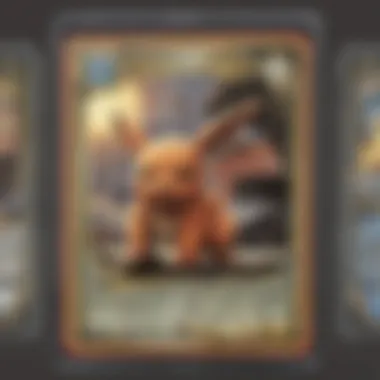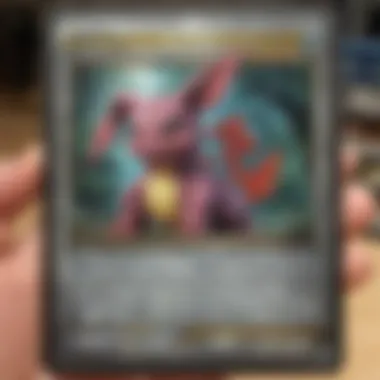Mastering the Art of Pokemon Card PSA Grading: A Comprehensive Guide


Pokemon Game Overview
In understanding the process of getting Pokemon cards PSA graded, it is crucial to delve into the intricacies of the vast Pokemon gaming universe. The history of Pokemon games spans decades, starting from its humble beginnings as a Game Boy game to the expansive world of console and mobile gaming it occupies today. The evolution of gameplay mechanics within the Pokemon series has been a journey of innovation and adaptability, as each iteration introduces new features and challenges for players to explore. From the classic Red and Blue versions to the latest Sword and Shield editions, the diversity of game versions offers a range of experiences for Pokemon enthusiasts to immerse themselves in.
Tips and Strategies
When venturing into the realm of Pokemon games, newcomers may find themselves overwhelmed by the complexity of game mechanics and strategies. A beginner's guide to Pokemon games is essential for laying a strong foundation, covering basic concepts such as type advantages, battle tactics, and resource management. As players progress in their journey, advanced gameplay tactics become instrumental in mastering the intricacies of competitive play, including breeding mechanics, move sets optimization, and team composition strategies. Team building strategies play a pivotal role in shaping a player's success, highlighting the importance of synergy, versatility, and adaptability in creating a formidable Pokemon team.
Character Spotlights
One of the defining features of the Pokemon series is its diverse array of iconic characters that have captured the hearts of fans worldwide. Featured Pokemon profiles offer a glimpse into the abilities, lore, and unique characteristics of popular characters such as Pikachu, Charizard, and Mewtwo. An analysis of these beloved Pokemon delves into their impact on gameplay, from their strengths and weaknesses in battle to their role in shaping the narrative of the Pokemon world. Understanding the nuances of these characters enhances players' appreciation for the depth and complexity of the Pokemon universe.
Latest News and Updates
Staying up to date with the latest news and updates in the Pokemon gaming community is essential for enthusiasts seeking to remain at the forefront of new developments. Recent game releases introduce fresh content, regions, and challenges for players to explore, keeping the Pokemon experience dynamic and engaging. Patch updates and events offer opportunities for players to participate in limited-time activities, acquire rare items, and engage with the community in new ways. Rumors and speculations circulating within the Pokemon community add an element of anticipation and excitement, fueling discussions and speculations about future game content and features.
Introduction to PSA Grading for Pokemon Cards
In the vast and intricate world of Pokemon card collecting, understanding the nuances of PSA grading plays a pivotal role. This section serves as a cornerstone for enthusiasts looking to delve deeper into the realm of card evaluation and authentication. The meticulous process of PSA grading ensures that each card is scrutinized with precision, providing a definitive grade that reflects its condition and rarity. By comprehending the intricacies of PSA grading, collectors can make informed decisions regarding their prized possessions, unlocking a deeper level of appreciation for the cards in their collections.
What is PSA Grading?
PSA grading is a comprehensive evaluation process conducted by Professional Sports Authenticator (PSA) to assess the condition, authenticity, and overall quality of Pokemon cards. Each card undergoes a detailed examination by trained experts who meticulously analyze factors such as centering, surface imperfections, corners, edges, and overall presentation. Through this meticulous scrutiny, cards are assigned a grade on a scale of 1 to 10, with 10 being the highest and most desirable grade.
Importance of PSA Grading in the Pokemon Card Market
The significance of PSA grading in the Pokemon card market cannot be overstated. Graded cards command a higher level of trust and credibility among buyers and sellers, ensuring transparency in transactions. PSA grades serve as a universal language that transcends geographical boundaries, allowing collectors worldwide to assess the quality of a card accurately. Furthermore, graded cards are shielded from disputes regarding condition, providing a tangible assurance of a card's worth and desirability.


Benefits of Getting Your Pokemon Cards PSA Graded
Getting your Pokemon cards PSA graded offers a myriad of benefits to collectors. Firstly, graded cards are encapsulated in tamper-evident cases, safeguarding them from damage and environmental factors. This ensures that the card's condition remains pristine over time, preserving its value and appeal. Moreover, PSA-graded cards are easily recognizable and sought after by discerning collectors, enhancing their marketability and desirability. Additionally, the graded card's certification provides a concrete assessment of its condition, eliminating subjective interpretations and uncertainties surrounding its grade.
Preparing Your Pokemon Cards for PSA Submission
In the vast and intricate world of Pokemon card collecting, the process of preparing your beloved cards for PSA submission holds paramount importance. This crucial step sets the foundation for the entire grading process, ultimately determining the assessment and value of your cards. By meticulously preparing your cards, you not only showcase a level of professionalism and care but also maximize their potential grade and market worth.
Card Selection Criteria
When considering which cards to submit for PSA grading, several key criteria come into play. Firstly, rarity plays a significant role; cards that are harder to find or are limited editions often hold more value in the eyes of collectors. Additionally, the condition of the card is crucial; cards without damage, creases, or ink smudges tend to receive higher grades. Moreover, the card's popularity and demand among collectors can also impact its grading and eventual worth. It is vital to carefully evaluate these factors when selecting cards for submission to ensure a successful grading outcome.
Card Sleeves and Protection
To safeguard your Pokemon cards during the submission and grading process, utilizing appropriate card sleeves and protection is imperative. Investing in high-quality, acid-free card sleeves ensures that your cards are shielded from environmental elements, such as dust and moisture, which could potentially damage or devalue them. Moreover, placing your cards in protective cases or holders adds an extra layer of security and preservation, mitigating the risk of any mishaps during transit or handling.
Documentation and Record-Keeping
In the meticulous world of PSA grading, thorough documentation and record-keeping play a crucial role in ensuring the authenticity and provenance of your Pokemon cards. Before submission, it is essential to accurately document details such as card specifics, purchase history, and any unique characteristics that may affect the grading process. Keeping detailed records not only aids in tracking the progress of your submission but also provides a comprehensive history of your cards, enhancing their overall value and credibility within the collecting community.
Submitting Your Pokemon Cards for PSA Grading
In the realm of Pokemon card collecting, submitting your cards for PSA grading holds paramount importance. This section of the comprehensive guide delves into the intricacies of ensuring your cards receive the appropriate grading they deserve. By submitting your Pokemon cards for PSA grading, you are not only enhancing their credibility and authenticity but also potentially increasing their market value. Understanding the submission process is crucial as it forms the foundation for the entire grading journey, impacting how your cards are perceived and valued in the collecting community.
Online Submission Process
Creating a PSA Account
The creation of a PSA account is a pivotal initial step in the online submission process. Establishing your presence on the PSA platform allows you to seamlessly access their grading services, track the progress of your submissions, and engage with other collectors in the digital space. This feature streamlines the submission process, making it convenient for Pokemon enthusiasts to efficiently navigate through the grading procedure and stay updated on their card assessments. While creating a PSA account provides a user-friendly interface for submissions, it also introduces a layer of security and authenticity to the grading experience, ensuring that each card is meticulously documented within the PSA system.


Filling Out Submission Forms
Completing submission forms accurately is a crucial aspect of the online submission process. This step requires collectors to provide detailed information about their cards, including card specifics, condition details, and any special attributes that may influence the grading outcome. Filling out submission forms meticulously ensures that the PSA graders have all the requisite data to assess the cards thoroughly and assign appropriate grades. Accuracy in filling out submission forms not only expedites the grading process but also fosters transparency and trust between collectors and the grading service, enhancing the overall grading experience.
Selecting Service Level
Choosing the service level for your submissions is a critical decision that influences the speed and thoroughness of the grading process. Selecting the service level allows collectors to tailor their grading experience based on their preferences and urgency. Whether opting for a standard service or an expedited assessment, each service level offers distinct benefits and considerations. Selecting the appropriate service level ensures that collectors align their expectations with the grading timelines and outcomes, ultimately shaping their overall satisfaction with the PSA grading service.
In-Person Submission
Amidst the technologically advanced era, in-person submission of Pokemon cards for PSA grading continues to hold significance for collectors. Attending card shows or conventions provides a unique opportunity for collectors to interact with fellow enthusiasts, gain insights into the latest market trends, and engage directly with PSA representatives. This hands-on approach to submission fosters a sense of community and camaraderie among collectors, enriching the overall grading experience. Interacting with PSA representatives in person offers collectors a chance to receive personalized guidance on their submissions, clarify any doubts, and immerse themselves in the world of Pokemon card grading. Additionally, submitting cards on-site at events streamlines the grading process, allowing for real-time evaluations and instant feedback that can shape collectors' perceptions and decisions in the grading journey.
Attending a Card Show or Convention
Attending a card show or convention presents collectors with a dynamic platform to showcase their collections, engage with like-minded individuals, and stay abreast of the evolving Pokemon card landscape. This interactive setting creates opportunities for collectors to network, trade, and learn from experts in the field, enriching their overall collecting experience. The vibrant atmosphere of card shows and conventions infuses a sense of excitement and discovery, making it an essential facet of the grading journey for passionate Pokemon card enthusiasts.
Interacting with PSA Representatives
Direct interaction with PSA representatives offers a personalized touch to the submission process, allowing collectors to receive guidance and insights from experts in the grading industry. Interacting with PSA representatives empowers collectors to address any queries, gain a deeper understanding of the grading criteria, and make informed decisions about their submissions. The expertise and professionalism of PSA representatives enhance the credibility and transparency of the grading process, instilling confidence in collectors about the accuracy and fairness of their card assessments.
Submitting Cards on-site
Submitting cards on-site at a card show or convention streamlines the grading process, providing collectors with immediate feedback and assessment of their cards. This real-time evaluation offers a convenient and efficient method for collectors to gain insights into the condition and grading potential of their cards, facilitating informed decision-making on the spot. By submitting cards on-site, collectors can maximize their grading experience by addressing any concerns, discussing grading options, and gaining valuable perspectives from on-site experts, catalyzing their journey towards acquiring prestigious PSA graded cards.
Understanding PSA Grades and Labels
In the expansive realm of Pokemon card collecting and trading, comprehending PSA grades and labels holds paramount importance. The PSA grading system serves as the definitive yardstick for evaluating the condition and authenticity of Pokemon cards, offering collectors a standardized method to assess the quality and value of their cards meticulously. Understanding PSA grades and labels empowers collectors with the capacity to make informed decisions when acquiring, selling, or trading Pokemon cards. By delving into the nuances of PSA grades and labels, collectors can decipher the intricacies of card evaluation, recognize the distinguishing features of different grades, and ascertain the factors that influence a card's grade and market worth.


Grading Scale and Criteria
The core foundation of the PSA grading system rests upon a meticulously structured grading scale and set criteria utilized to evaluate Pokemon cards. The grading scale ranges from 1 to 10, with each numerical grade representing a distinct tier of card quality and condition. Understanding the intricate details of this scale is imperative for collectors, as it delineates the specific attributes and flaws that define each grade, from the pristine Gem Mint 10 to the heavily worn Poor 1. Moreover, familiarizing oneself with the criteria used to assess cards, such as centering, surface quality, corners, edges, and overall appeal, equips collectors with the expertise needed to accurately interpret and anticipate the assigned grade of their cards by PSA experts.
Types of PSA Labels
In the realm of PSA grading, the types of labels affixed to Pokemon cards serve as vital indicators of both the card's grade and its unique characteristics. PSA labels distinguish between different card variations, such as holographic, first edition, shadowless, and promotional cards, providing collectors with valuable insights into the specific attributes of their cards. Understanding the significance of each label type enables collectors to discern rare and exclusive cards from their standard counterparts, thereby influencing their desirability and market value. By familiarizing oneself with the various types of PSA labels and their implications, collectors can navigate the vast landscape of Pokemon card varieties with acumen, identifying prized specimens and leveraging their knowledge to enhance their collections strategically.
Interpreting PSA Grading Results
In the intricate world of Pokemon card collecting and trading, understanding how to interpret PSA grading results is paramount. This segment delves into the crucial aspect of comprehending the significance of the grades assigned to your beloved cards through the Professional Sports Authenticator (PSA) grading system. By decoding these grades, enthusiasts can discern the condition and value of their cards with precision, laying the groundwork for informed decisions regarding storage, display, selling, or trading. It serves as a guiding light, illuminating the path to maximizing the potential of your Pokemon card collection.
Reviewing Grading Reports
Upon receiving your graded Pokemon cards from PSA, the next step is delving into the detailed grading report provided. These reports act as treasure troves of information, meticulously outlining the factors considered in the grading process. From centering and surface quality to edges and corners, each element is scrutinized and reflected in the final grade. By thoroughly reviewing these reports, collectors gain insights into the specific strengths and weaknesses of each card, enabling them to appreciate the nuances that contribute to its overall grade. This meticulous examination fosters a deeper understanding of the grading process and empowers collectors to make informed decisions regarding their prized possessions.
Understanding Population Reports
In the realm of PSA grading, population reports wield considerable influence, offering a comprehensive overview of the cards graded by PSA. These reports provide valuable data on the scarcity and availability of specific card grades, shedding light on the relative rarity of your graded cards. By understanding population reports, collectors can gauge the relative rarity of their cards within the PSA population, influencing their perceived value in the market. This insight not only aids in strategic decision-making but also enriches the collector's knowledge of the broader Pokemon card landscape, fostering a deeper appreciation for the intricacies of card grading and rarity assessment.
Maximizing the Value of Your PSA-Graded Pokemon Cards
In the realm of collecting and trading Pokemon cards, maximizing the value of your PSA-graded cards is a crucial component. By ensuring that your cards are well-preserved and properly showcased, you can significantly enhance their desirability and worth in the market. The condition of a graded card plays a pivotal role in determining its value, making it imperative to adhere to proper storage and display practices. Safeguarding your PSA-graded cards not only maintains their pristine state but also safeguards their investment potential, further solidifying their value over time.
Storage and Display Tips
When it comes to storing and displaying your PSA-graded Pokemon cards, attention to detail is key. Utilizing protective sleeves, acid-free storage boxes, and UV-resistant display cases can shield your cards from external elements that may deteriorate their condition. Proper climate control, away from direct sunlight and moisture, is essential in preserving the integrity of your graded cards. Additionally, investing in quality display options that highlight the uniqueness of each card can elevate their aesthetic appeal and attract potential buyers or traders.
Selling or Trading PSA-Graded Cards
Navigating the process of selling or trading your PSA-graded cards requires a strategic approach to maximize returns. Understanding market trends, evaluating card rarity and demand, and establishing fair pricing are essential steps in achieving a successful transaction. Online platforms, auctions, and card shows serve as viable avenues to connect with potential buyers or traders. Leveraging comprehensive grading reports and reputable third-party authentication can instill confidence in prospective buyers, facilitating smoother transactions and promoting trust within the trading community.
Market Trends and Demand
Stay abreast of evolving market trends and demand fluctuations to make informed decisions regarding your PSA-graded Pokemon cards. Monitoring the trading landscape, identifying popular sets or cards, and predicting future market movements are integral to capitalizing on lucrative opportunities. Factors such as card scarcity, iconic artwork, and competitive gameplay influence the demand for specific cards, driving their market value. By remaining proactive and adaptable to market dynamics, collectors and traders can position themselves advantageously in the ever-changing landscape of Pokemon card valuation.







